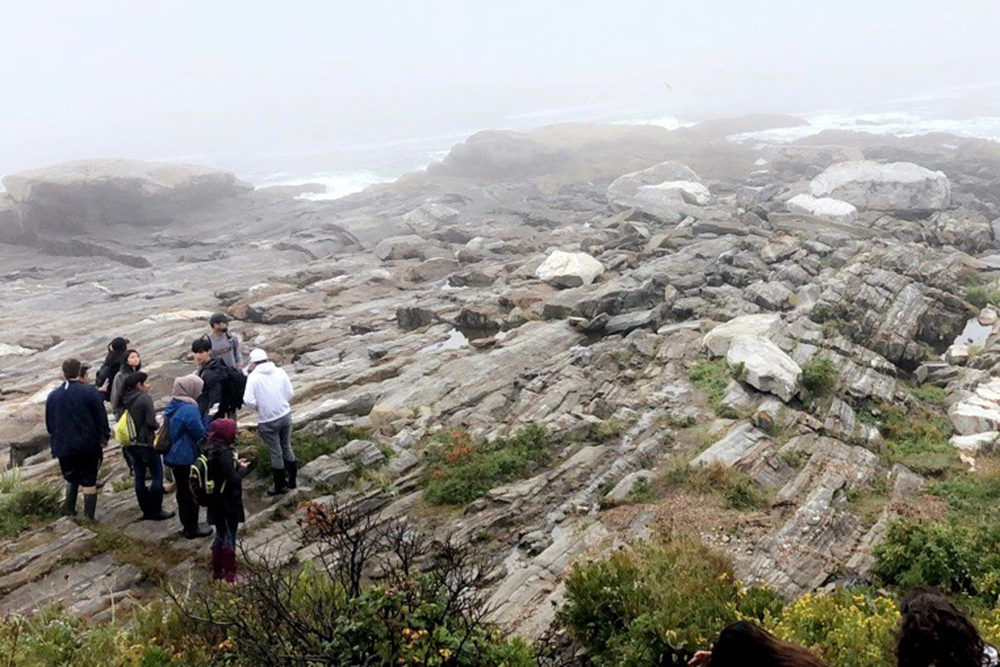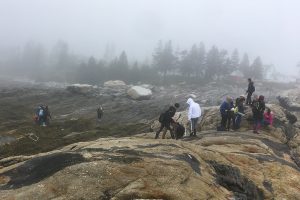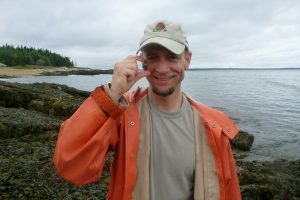 Science classes at Adelphi often incorporate field study. The Marine Biology class taught by Aaren Freeman, Ph.D., virtually revolves around it, engaging in what Dr. Freeman calls “boots-in-the-mud type of work.”
Science classes at Adelphi often incorporate field study. The Marine Biology class taught by Aaren Freeman, Ph.D., virtually revolves around it, engaging in what Dr. Freeman calls “boots-in-the-mud type of work.”
“My class is structured in a way that we can leave campus frequently and do fieldwork,” says Dr. Freeman, associate professor of biology and graduate coordinator of environmental studies.
 “The whole marine coast changes from sandy beach or salt marsh habitat to a mixture of salt marsh and rocky shore,” he says. “You get organisms up in Maine that you’d never see down on Long Island—like sea urchins and different species of crabs and sea stars.”
“The whole marine coast changes from sandy beach or salt marsh habitat to a mixture of salt marsh and rocky shore,” he says. “You get organisms up in Maine that you’d never see down on Long Island—like sea urchins and different species of crabs and sea stars.”
This September, he and the more than 20 students in his class visited the University of Maine’s Darling Marine Center to examine its rocky intertidal marine sites. Bunking in rustic cabins on an old farm, they explored habitats at the center, identifying species and gaining a deeper appreciation of sea life and ecosystems different from those on Long Island.
There’s another reason the class makes the long trip to Maine. “A disproportionate amount of research in marine biology is done on similar types of rocky shores, and I think it’s important for students to experience firsthand what that might mean,” Dr. Freeman says.
After their marine lab experience, the class traveled offshore to Jeffreys Ledge, an underwater plateau off the coast of New Hampshire that is about 100 kilometers long and five to 10 kilometers wide and is a major whale feeding ground. Students spent about four hours on a whale watch observing the feeding behaviors of humpback whales, as well as fin whales, dolphins and ocean sunfish.

Teaching assistant Laura Fallon says the trip allows students to “be hands-on and really understand how different ecosystems work.” It’s a direct benefit of Adelphi’s small class sizes, since students can come together in a small group for fieldwork.
For Danielle Green, a junior biology major from Wantagh, New York, the Maine trip increased her interest in marine life.
“I learned so much about marine life and was exposed to so many new and interesting species,” Green says. “It gave me the opportunity to explore the field and understand just how diverse the oceans are.”
Later in the semester, students will visit the Fulton Fish Market in the Bronx, New York, to study the diverse population of fish that come from all over the world. The market sells tuna caught in Australia, bass from Argentina, European goosefish and oysters caught on Long Island. Since the fish market is only open from 1:00 a.m. to 5:00 a.m., Dr. Freeman’s students meet at midnight to head over to the market.
“Our experience leads to discussions about conservation and carbon footprints and so much more. It provides a global perspective in a very local market,” Dr. Freeman says.
 Science classes at Adelphi often incorporate field study. The Marine Biology class taught by Aaren Freeman, Ph.D., virtually revolves around it, engaging in what Dr. Freeman calls “boots-in-the-mud type of work.”
Science classes at Adelphi often incorporate field study. The Marine Biology class taught by Aaren Freeman, Ph.D., virtually revolves around it, engaging in what Dr. Freeman calls “boots-in-the-mud type of work.” “The whole marine coast changes from sandy beach or salt marsh habitat to a mixture of salt marsh and rocky shore,” he says. “You get organisms up in Maine that you’d never see down on Long Island—like sea urchins and different species of crabs and sea stars.”
“The whole marine coast changes from sandy beach or salt marsh habitat to a mixture of salt marsh and rocky shore,” he says. “You get organisms up in Maine that you’d never see down on Long Island—like sea urchins and different species of crabs and sea stars.”
